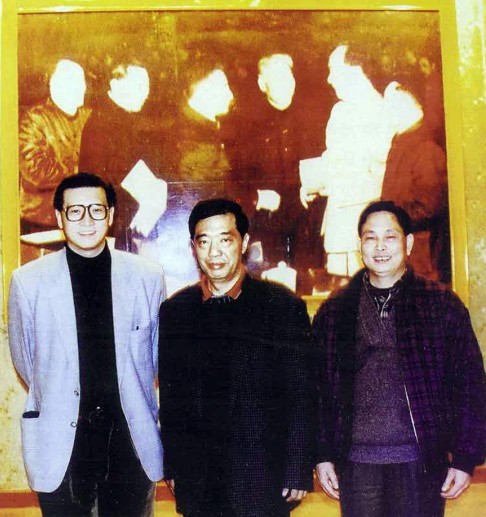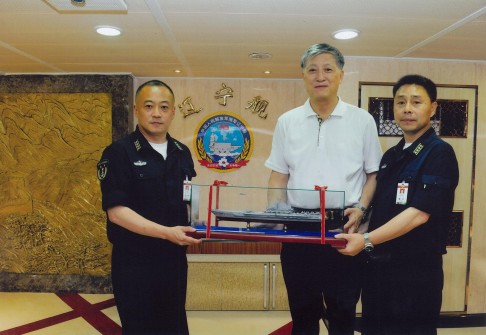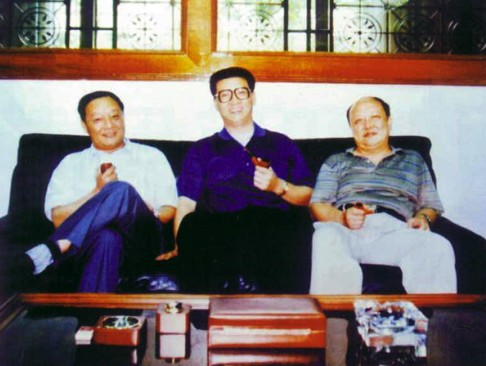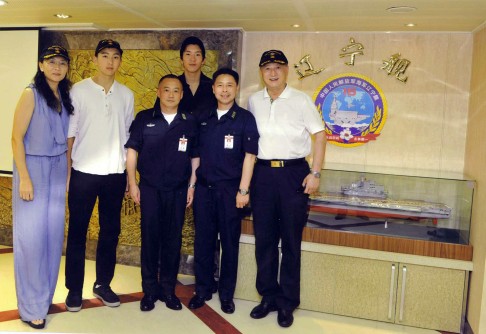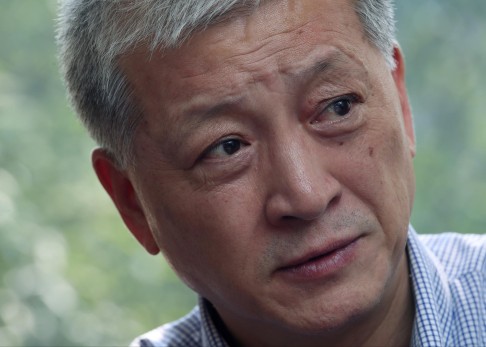
'Unlucky guy' tasked with buying China's aircraft carrier: Xu Zengping
Xu Zengping opens up about the clandestine operation to buy the Liaoning and unfinished business
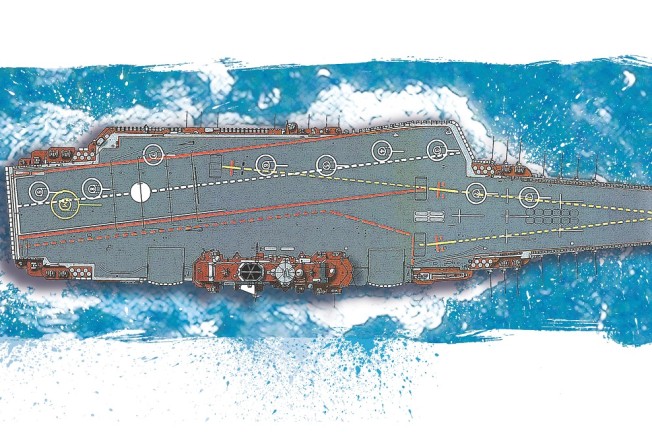
It was a stealth operation like no other in China - even the highest echelons of political power were kept in the dark.
The only sign, if anybody had been looking, emerged in April, 1997, just a few months before Hong Kong's return to China. It was then that Hong Kong-based businessman Xu Zengping, best known for owning a Palace of Versailles-style home on The Peak, opened an unassuming office in three rented suites of Beijing's Grand Hotel.
To the outside world, the sole purpose of the office, with its sweeping views of the Forbidden City, was to organise a stunt on the Yellow River to mark the handover.
But inside, Xu's staff were coordinating one of the biggest covert deals in the military's history - the mission to buy an unfinished Soviet aircraft carrier from Ukraine and deliver it to China.
Xu, a former captain of the Guangzhou Military Command basketball team, said he had been persuaded over the course of several talks to take on the challenge by the then-deputy commander of the PLA Navy, vice-admiral He Pengfei.
"He told me that it was a once-in-a-century opportunity for China to buy a new carrier," Xu told the South China Morning Post in an exclusive interview. Two other Hong Kong businessmen had turned down the request, leaving Xu as the only man standing.
"I was totally convinced and moved by him when he held my hand and said: 'Please do me a favour - go and buy [the carrier] and bring it back for our country and our army'."
Xu said the two met about a dozen times between April, 1996 and February, 1998. One of the most memorable meetings was on July 10, 1996, when, at He's invitation, Xu attended a parade in Qingdao in Shandong province to see off the North Sea Fleet on a trip to North Korea. It was one of the rare occasions that a civilian had been invited to such an event - all the more so because it was the fleet's first trip to North Korea.
After the ceremony, He asked Xu to stay on at the navy's Beihai Hotel for three days, using the time to try to convince the businessman to take on the task. On the last day, a naval plane sent He and Xu to Beijing and the two continued discussing plans for the carrier deal. That was when Xu said he would consider going to Ukraine to negotiate the purchase. Xu finally agreed in March, 1997 to broker the deal. The vice-admiral was present again in Guangzhou in late 1997 to bid Xu farewell on his mission.
"I promised He that I would take the carrier home at any cost because I really appreciated his patriotism. He was a responsible leader who devoted himself to China's long-term defence and maritime strategies, daring to take political risks for the right decision," Xu said.
At the time, Beijing was wary of antagonising the United States and had told the military to shelve its plans to build or acquire a carrier. Such an offensive vessel, it was thought, would send the wrong aggressive signal to Washington. A carrier was also an expensive proposition - one China could ill-afford.
So the whole project had to be conducted in secrecy, with Xu acting as a proxy for He and pretending to buy the ship to set up a floating casino in Macau.
According to Xu, the navy had been hard at work in preparation since the cash-strapped Ukrainian Black Sea Shipyard announced in 1992 that it would sell the Varyag. In the new post-cold war order, the shipyard needed money and the aircraft carrier was its biggest floating asset.
China had already bought and refitted a 37,000-tonne refuelling ship from the former Soviet supplier; today the "Qinghai Lake" vessel is part of the nation's anti-piracy mission in the Gulf of Aden.
To hold up his end of the bargain, Xu sold his coveted home on The Peak, mortgaged a plot of land on Peng Chau and took loans from business partners. It wasn't easy - this was at the height of the Asian financial crisis - but he summoned enough cash to open two offices for the deal, one in Beijing and another in Kiev. "I rented three business suites in the Grand Hotel in early 1997 and made it our Beijing office … We set up another company in Kiev and a dozen shipbuilding and naval experts were sent there to work to negotiate with the Ukrainian authorities," he said.
The Beijing office stayed open for 18 months and was shut down the moment Xu signed the carrier deal contract with the Ukrainian authorities in March, 1998. The Kiev operation continued until the carrier left the Black Sea Shipyard in July, 1999, Xu said. "I paid all the operating costs of the two offices," Xu said.
In 1998, then-premier Zhu Rongji formally rejected the carrier project, according to China's Carrier, a book published by China Development Press, and Xu said that the central government's lack of support meant the navy could not refund him.
Xu claimed he spent at least US$120 million of his own money on the deal between 1996 and 1999, covering costs that included running the two offices, the US$20 million auction price for the carrier, towage fees, overdue payments and port fees.
Whatever the personal and financial price, buying the ready-made carrier may have helped save China at least 15 years of scientific research, one mainland naval expert said.
Xu has had no official recognition of his contribution and state media have never clarified his link with the carrier. It is still unclear how the only person to sign the contract with the Ukrainian authorities handed the ship over to the Chinese government.
Two of the military officials at the centre of the covert operation cannot say: vice-admiral He died in 2001, a year before the carrier arrived in China, and another key player, former PLA intelligence chief Ji Shengde, who also worked with Xu behind the scenes, was jailed for life on corruption charges by a military court in 2000.
And Xu certainly won't say. He told the Post in an earlier interview that he "didn't sell the ship to either the government or the military".
Asked if the carrier was a gift to the navy, Xu answered: "Did you see any presentation ceremony for the carrier? I can tell you that it never happened. I can only say that I was an unlucky guy because … key senior military officials involved in the deal are either dead or in jail," Xu said.
Despite the lack of official recognition, Xu is well regarded among the top ranks of the navy. On August 10, 2013, a year after the refitted carrier went into service as the Liaoning, Xu and his family were welcomed aboard the vessel by the two men at its helm, Captain Zhang Zheng and political commissar Mei Wen.
On the backroom role of Ji, Xu said he was the "real boss" who gave his stamp of approval on the deal. Xu said that when he set up a Beijing office to oversee the deal, it was Ji who agreed to Xiao Yun , then deputy head of the naval air force's armament department, heading the office. Xiao retired from the military to take on the new job.
Zhong Jiafei, a former project agency head of the Central Military Commission's Arms Trading Company, was the middleman between He and Xu. "The roles of Xiao and Zhong were arranged by me, and Ji personally endorsed my planning and gave me a lot of support and professional advice," Xu said.
Macau-based military observer Antony Wong Dong said Xu was one of the navy's unsung heroes. "It seems like the navy sent Xu's contributions up in flames after the death of He and Ji's incarceration. Besides He and Ji, no one is qualified to testify to his efforts in the carrier deal," Wong said. "Many unsung heroes lost their lives during the carrier's refit and trials. Xu is just one of the casualties of the carrier project's rough ride over the past four decades, thanks to the PLA's lack of transparency."
Key dates in secret deal for China's aircraft carrier
March, 1992 - Navy sends a delegation to Ukraine's Black Sea Shipyard
November 6, 1992 - Navy buys a half-finished 37,000-tonne refuelling ship from Ukraine. The ship is designed to be a supply vessel for a Soviet aircraft carrier
1993 to 1995 - Carrier project on hold due to the central leadership's opposition
April, 1996 - Vice-admiral He Pengfei approaches Xu Zengping
March, 1997 - Xu decides to take up the mission
April, 1997 - Sets up an office in Beijing
June, 1997 - Sets up an office in Kiev
August, 1997- Sets up a Macau shell company as part of the "floating casino" cover plan
October, 1997 - Xu flies to Ukraine for talks
December, 1997 - Xu pays HK$6 million to the Macau authorities for casino documents
February 1, 1998 - Xu flies to Kiev again with the documents, US$2 million in cash and dozens of bottles of Chinese liquor
March 19, 1998 - Xu wins the bid for the carrier with a US$20 million offer
March 20, 1998 - Carrier's blueprints, weighing 40 tonnes, are sent overland to Beijing
Late March, 1998 - Xu shuts down his Beijing office
July, 1999 - Carrier begins its journey from the Black Sea to China
Late 1999 - Xu closes his office in Kiev
March 3, 2002 - Ship arrives in Dalian, Liaoning
